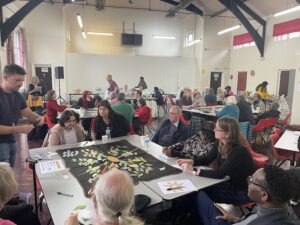Research supports the role of faith spaces in support of healthy ageing
 Researchers from the Manchester Urban Ageing Research Group (MUARG) have spent 18 months examining how faith spaces in Greater Manchester support different groups of older people within their communities.
Researchers from the Manchester Urban Ageing Research Group (MUARG) have spent 18 months examining how faith spaces in Greater Manchester support different groups of older people within their communities.
Greater Manchester growing older population is becoming increasingly culturally diverse. The city region faces high levels of inequality around health, income and access to neighbourhood services. In this context, faith spaces provide much needed support and places for social connection. However, they are rarely acknowledged for the work they do, are mostly self-funded, and rely on mainly older volunteers to deliver their services.
Researchers spoke to a wide range of partners including local authority public health and neighbourhood officers, third sector organisations, faith-based and interfaith networks, and diverse groups representing older people from across Greater Manchester. A range of participants contributed to the data including faith leaders or faith community representatives, as well as older people who are regular users of faith spaces.
The research found that faith spaces provide spiritual wellbeing, belonging and a sense of community by serving as ‘social connectors’, and that they provide practical and emotional support across gender and social class.
The research also uncovered high inequality across different neighbourhoods, as well as social isolation amongst groups and individuals within the older population. Such experiences are reflected in the provision of various services by faith spaces, these often targeting recent migrants, those experiencing isolation and/or financial hardship, and people undergoing challenging life transitions such as bereavement, divorce, health problems and relocation.
In the final project report, researchers call for a more strategic involvement of faith-based groups in public health and age-friendly agendas. Taking into consideration the existing support happening in faith spaces and the opportunities for that work to be expanded, they suggest that policymakers should explore how to enhance the role of faith spaces in contributing to promoting health and wellbeing in the community, and provide support to enhance the social function of faith spaces, both for existing users and members of the wider community.
